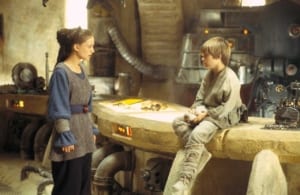Beating Star Wars Prequels is like beating a punching bag. It’s satisfying, it seemingly does no harm and helps one to hone their (film critic) skills. But I feel there is something more to this glorious mess than obvious failures. But what is it?
I feel like right now, when a standalone graced us with big screen return of an Episode I episodic villain, it’s time to talk about the Prequels in a more friendly way.
A Baby Duck Syndrome
You may say, I have a bias in this discussion. Attack of the Clones was the first Star Wars movie I’ve ever watched. I had read several Expanded Universe books before, that’s true, but it was Episode II that defined for me what does “a Star Wars movie” even mean.

Did I see its problems? Of course I did. But it was bright, it was eye-catchy, it had gorgeous scenery and I was young enough to give everything else a pass as long as the picture was enjoyable. But what was more important, it was flesh and blood to the carcass of the universe I had from books.
It was a living, breathing world with its conflicts, visible or implied, its structure, its inhabitants from all walks of life. It told almost as much as it left unspoken: who was this man Jango Fett, where from do the refugees flee to verdant Naboo, how comes Padme has such a power in the Senate, but has to be afraid of a slightest scandal…
Basically, ever since then I had hold to an unpopular idea that while the Original Trilogy was far better from cinematic standpoint, the Prequels were better as a gateway product. The OT tells its story and does it brilliantly; the PT not only tells a story, but entices to look for thousands other stories lurking between its lines.
But here lies the question… enticing is nice, but do Prequels tell any story?
Yes, They Do. And Not a Bad One.
If you perchance decide to sit down and recant to your acquaintance a story of the Prequel Trilogy, you’d find out that it exists. Unlike with, say, a certain HBO series, it’s not hard to trace all storylines and see that they all wrap nicely. There is a zag for every zig, there is a plant for every seed.
You have a broader picture with civil unrest, corrupt government and greedy corporations. You have an intimate story of a person in search of his personhood, who ultimately loses it. Every action has a good motivation behind it, be it Qui-Gon’s desire to prove his own vision of the Force or Anakin’s readiness to sacrifice everyone only to keep what he thinks belongs to him.
But all that true gold is buried under bad directing, bad cinematography, ambitious but not yet capable CGI and the fact that all the movies were filmed right away from a treatment and with no cohesive script.
That is the true tragedy of the Prequels. And yet, if you don’t watch them but sit and recant what happened, this story starts shining through the hills of schlock.
It Even Has Themes!
And when you look on this substance buried under abysmally bad style, you find that the Prequels actually have a theme they adhere to. And that is a theme very important to Star Wars as a whole.
Original Trilogy told us about neccessity of being proud and militant in our beliefs. Prequel Trilogy told us about dangers of being prideful and fighting for the wrong cause. Hubris, that sin most vile yet least evident, transcends all that happened then.
Everyone is guilty. The Jedi are confident they know all. Qui-Gon is confident he sees the way nobody could’ve seen. Obi-Wan is confident he knows best what Anakin needs. Amidala sees herself as a one true beacon of lawful democracy. Dooku believes he will reforge a really rusty mechanism into something good and working. Anakin… well, he has all that and then some. Everyone is oh so sure that they–and nobody else–know what needs to be done.
All the while the antagonist just stands in the shadows, allowing them to blindly pursue their goals, inevitably destroying each other in process. He doesn’t even show them the way. It’s enough to give them a key to a door they already seek with all their heart.
And We Hate Them More than They Deserve
I’ve gone by a great article on what is Jar-Jar actually about. This is all true, yet we see only an annoying clown because–again–clumsy directing, bad scripting, racism. Yet even all this doesn’t explain the active and flaming hate towards a mostly harmless character.
We all laugh at scripting, but do you know? The lines most laughed at are actually among the best from the psychological standpoint.
Only a laziest person hadn’t have their laugh at “I’m a person, my name is Anakin” line, but… heck, isn’t it the core of Anakin’s problem at the very moment? He sees a girl, a possible friend, an interesting and new face so unlike anything he had seen on Tatooine before. And what does she see, in turn? Well, a slave.
Or take this accursed dialogue from Attack of the Clones:
Padme: “We used to come here for a school retreat. We would swim to that island every day. I love the water. We used to lie out on the sand and let the sun dry us and try to guess the names of the birds singing.”
Anakin: “I don’t like sand. It’s coarse and rough and irritating and it gets everywhere.”
It is actually… good? It has a priviledged girl reminiscing of a priviledged life and a boy from a completely different background who cannot even understand what she is talking about. Sand hurts, he knows. But he’s madly in love, so, maybe here on her planet even sand is not that bad?
A good piece of dialogue, actually exploring the characters? But we’ve laughed at it for twenty years.
The Bad, The Good And the Franchise
I’m not trying to tell PT is all brilliant or whatnot. Revenge of the Sith was so bad I’ve actually quit watching it several times and finally made it ten years after the release. It falls apart, it has no structure, mad pacing and several bright action pieces splashed through it. It’s almost like Rogue One, only worse–more glaring–in every aspect. Yet even this movie managed to carry on the themes and the story, it just butchered them with even less mercy than the previous ones.
And if you watch the story by numbers, you can see those themes echooed in the OT, giving it the much needed humanity, much needed past to their present struggle. Giving a meaning to that struggle, even.
And while it’s frequently said that Sequels “ignore” the PT, I can only laugh, because they actually continue to explore the same themes. What is human life in this Far Far Away Galaxy? How the sins and the virtues of the parents are mirrored in the children?
Luke was Anakin’s son, brash and emotional and never able to sit and wait. He was Padme’s son, empathetic and caring and thinking himself in charge of everything and guilty whatever goes wrong. Same with Leia, actually–you can see both her parents in her, but also the untyielding spirit of Bail Organa.
Leia and Mon Mothma bear the dream of true republic—but what happened to their dream? And is it hubris, ever ruining any good prospect, raising its ugly head again?
Without PT, the Sequels are really a grimdark “no good stays forever”. But Prequels show us why exactly is it not enough to blow up an Emperor to have a happily ever after. And Sequels take the torch to show what is it we have to do for a happy ending.


